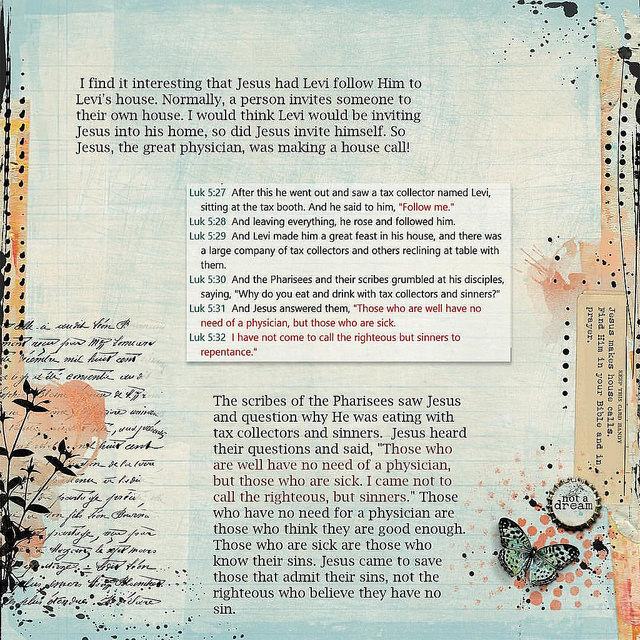My Corner Online
Reading through the Gospels 46
Mark 2:13-17, Matthew 9:9-13, Luke 5:27-32

Mark 2:13-17, Matthew 9:9-13, Luke 5:27-32 JESUS EATS WITH SINNERS AND LEVI'S HOUSE; CALLS LEVI
Location: again by the sea of Galilee
The crowds of people were following Him. I love how we see a visual of crowds following Jesus. Sometimes today it feels as if I follow Jesus alone, in the privacy of my own room and house, knowing there are many others out there, but still being alone most of the time just with Jesus. The crowds allows me to think of putting all the Christians of the today together in my head and seeing the huge crowd following Him now, which is much, much greater than during Jesus's time on earth.
Jesus passed by Levi the son of Alphaeus sitting in a tax booth and said "Follow me" and the guy did! Just like that he rose and followed Jesus with only two words! What power Jesus's words have. The story continues in Levi's home (not Jesus's home, see Luke 5:29) where he is sitting with many tax collectors and sinners, reclining and looking relaxed at the table. In Luke we read that Levi made a big feast, so the many tax collectors and other types of known-to-be sinners would have been Levi's friends. The stage is set for Jesus's teaching. I find it interesting that Jesus had Levi follow Him to Levi's house. Normally, a person invites someone to their own house. I would think Levi would be inviting Jesus into his home, so did Jesus invite himself. So Jesus, the great physician, was making a house call!
The scribes of the Pharisees saw Jesus and question why He was eating with tax collectors and sinners. Jesus heard their questions and said, "Those who are well have no need of a physician, but those who are sick. I came not to call the righteous, but sinners." Those who have no need for a physician are those who think they are good enough. Those who are sick are those who know their sins. Jesus came to save those that admit their sins, not the righteous who believe they have no sin.
This story shows the heart of the Pharisees in that they had difficulty showing love to any sinner, but rather shunned them. Being a Christian is not a popularity contest as the Pharisees were concerned with their outward appearance of godliness. Jesus loves everyone and accepts them as they are, even in his (Levi's) home, and is relaxed sitting with them. Jesus gladly associates with all sorts of people. Jesus did not discriminate! If someone wanted to hear His message, He was glad to sit with them and tell them. Yes, I do need to be careful of the friends I choose and who I associate with, but just like Jesus, I need to love them and if they are willing to listen about Jesus, no matter their reputation, I should be relaxed sitting with them. Sometimes the people with the worst reputations are the most shunned and therefore never have a chance to hear the message of Christ. These are the people who need it most, but because they are shunned, they never have an opportunity to be told of Jesus.
A disciple is a follower or student of a teacher. Levi and the other sinners became followers of Jesus and students of Jesus. It does not say that Levi left "everything" as the 12 disciples, but merely followed him to listen to Jesus for that day. I would imagine that he would continue to learn about Jesus as he became a different kind of tax collector in his daily life.
Tax collectors were considered bad sinners because of the love of money in that they could keep whatever they collected over the amount paid to the government, leading to extortion. Tax collectors would over-charge, threaten, blackmail, or cheat in order to get more money. Tax collectors would have a "tax contract” for a city with the Romans. The Romans awarded a contract to the highest bidder. The man collected taxes, paid the Romans what he promised, and kept the remainder.
Was a tax collector considered worse than the mother-in-law, a paralytic, a leper, and a demon-possessed who Jesus previously had healed? A tax collector had a choice to be who they were and were despised by the Jewish people. The mother-in-law, a paralytic, a leper, and a demon-possessed really did need a physical healing. Here, Jesus compares the healing physically to the healing of sins.
I wonder if the fish that the Simon Peter, Andrew, James, and John had caught as their work were taxed? What if Levi had been the one collecting their taxes in Capernaum? Jesus would have brought them together for this teaching moment.